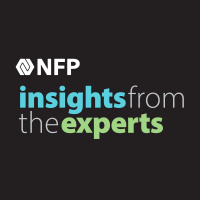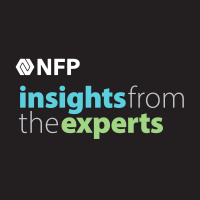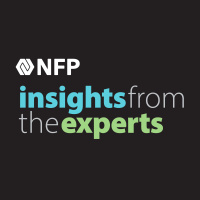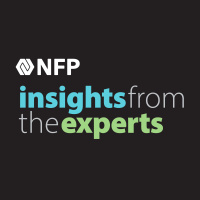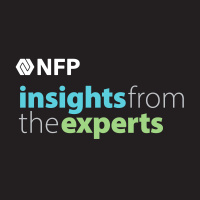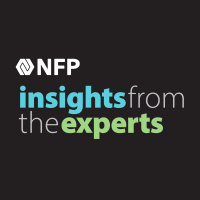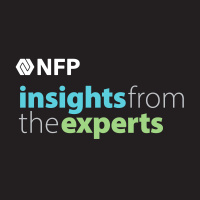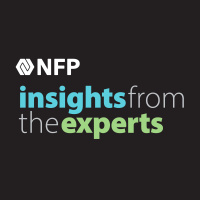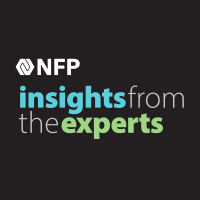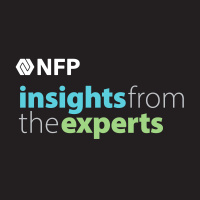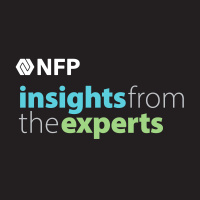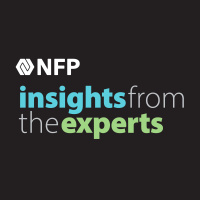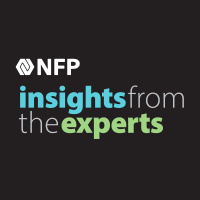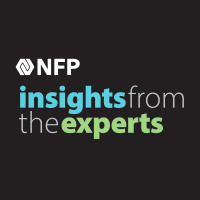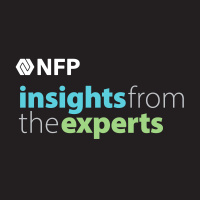Sinopsis
NFP Benefits Compliance Podcast channel.
Episodios
-
Ep 72 - Innovation: Using Data for a Safer, Healthier Workplace with futureWork
22/04/2020 Duración: 28minfutureWork captures and interprets the data that surrounds every worker to improve health and safety. And now with COVID-19 they are now helping companies record and report employee temperatures. Join us for this episode as Head of Innovation Mark Rieder, sits down with Lars Skari, cofounder of futureWork, to discuss how wearables can help Americans get back to work.
-
Ep 71: FFCRA FAQs, State COVID-19 Updates and Potential Phase 4 COVID-19 Legislation
09/04/2020 Duración: 21minIn this episode, Chase Cannon and Suzanne Spradley dive back into common COVID-19 questions. The two start with process and documentation of employee leave requests under the FFCRA, including recordkeeping for employers to claim the FFCRA tax credits. Chase then outlines several different buckets of developments at the state level, including paid sick, family, and medical leave changes on account of COVID-19. The two close with a look ahead at potential additional changes Congress could introduce in so-called “Phase 4 Legislation”, including COBRA subsidies and mandates for group health plan coverage of COVID-19 treatment.
-
Episode 70: FFCRA/COVID-19 FAQs, Unemployment Eligibility and Business Interruption Insurance
01/04/2020 Duración: 21minIn this episode, Suzanne Spradley and Chase Cannon discuss recent questions popping up from employers regarding the FFCRA, COVID-19 and furlough situations. Suzanne outlines the issues to consider in determining if FFCRA applies, including factors in employee counts to determine if an employer is above or below the 500-employee threshold and whether the 50-employee small exception is automatic. Suzanne and Chase discuss furloughs, and whether FFCRA applies to furloughed employees. The two then discuss unemployment insurance, and whether furloughed or laid off employees might qualify for unemployment benefits (and how the newly enacted CARES Act expands unemployment benefits). The two close with a discussion on the P&C side — business interruption insurance, and how state and federal legislation might impact how business interruption insurance works in the COVID-19 environment.
-
Episode 69: Benefits Compliance Considerations of the Coronavirus Crisis
17/03/2020 Duración: 13minIn this episode, Elizabeth Allen and Patrick Myers address some of the benefits compliance questions swirling around the issue of the coronavirus pandemic. The two briefly discuss the virus and go into more detail on the employee benefits laws that employers must consider as they make business decisions concerning the virus. Specifically, they discuss the coronavirus and its implications under the HSA rules, HIPAA, FMLA, ACA, Section 125 and COBRA.
-
Episode 68: Legislation and Considerations on Surprise Medical Billing
04/03/2020 Duración: 17minIn this episode, Suzanne Spradley and Chase Cannon address the hot issue of surprise medical billing. Suzanne outlines what is a surprise medical bill and how common of an issue it is to receive one. Suzanne and Chase discuss the challenges for patients that receive out-of-network provider services and bills at in-network facilities. Suzanne outlines three different bills that address surprise medical billing that have been discussed by Congress at the federal level, as well as state legislative action. Suzanne and Chase round out the podcast by talking about different approaches in each proposal, and what to expect down the road in 2020 from states and Congress.
-
Podcast 67: Updates on COBRA and Employer Mandate Lawsuits, and New State Reporting Requirements
04/02/2020 Duración: 16minIn this episode, Chase Cannon and Suzanne Spradley address two lawsuits, and discuss some new state employer reporting obligations. The first lawsuit relates to one covered in Episode 66 on COBRA notice failures—the Sixth Circuit weighed in and overturned the District Court on whether a change in the premium payment turns constitutes a COBRA triggering event. The second lawsuit relates to the ACA’s employer mandate. A court recently approved a settlement in a case where the employer intentionally reduced hours for employees who were previously eligible for or enrolled in the company’s group health plan; the employer’s intent was to avoid offering those employees affordable coverage under the mandate. Chase outlines the settlement, and the reasons why the employees in the case were able to assert an ERISA 510 claim against the employer to the point of a settlement, even if the court did not ultimately resolve the 510 legal issue. Chase and Suzanne discuss the importance of continued compliance with the mandate
-
Podcast 66: Recent Lawsuits Relating to COBRA Notice Failures
22/01/2020 Duración: 16minIn this episode, Suzanne Spradley and Chase Cannon look at three recent lawsuits, two of which are class action suits, against employers relating to COBRA notice failures. Suzanne describes the lawsuits, and explains that the failures related to the content of the notices themselves, rather than the more common issue of failure to send COBRA notices. Suzanne outlines the particular failures, and how the employer could’ve avoided the issue. The two discuss the importance of using model notices and things to consider when working with a third party vendor for COBRA administration
-
Ep 65: Cadillac and HIT Taxes Repealed, PCOR Revived, and More from End-of-2019 Spending Bill
07/01/2020 Duración: 13minIn this episode, Chase Cannon and Suzanne Spradley review the end-of-2019 spending bill, which includes several provisions relating to employee benefits and group health plan/employer compliance. Chase starts by describing the bill, and then jumping in on a discussion relating to the full repeal of the Cadillac Tax. The two then discuss the health insurance tax (HIT), and the impact of its repeal beginning in 2021. Chase outlines three other provisions that are less directly impactful — the repeal of the medical device tax, the repeal of a commuter benefit tax for tax-exempt organizations, and a one-year extension of the tax credit for employers that provide paid medical and family leave. Chase and Suzanne then turn their attention to a surprise in the bill: A 10-year extension of the PCOR fee. The two close with a discussion of things employer might’ve wanted in the bill, and a look at what’s ahead in 2020.
-
Podcast Episode 64: Health Care Costs: U.S. Versus Other Countries
10/12/2019 Duración: 16minIn this episode, Suzanne Spradley and Chase Cannon dig in to the issue of health care costs in the U.S. as compared to other countries. Suzanne begins the discussion by outlining the Organization for Economic Cooperation and Development (OECD) data that has been tracking the cost of health systems in the world since 1986. Suzanne explains the different factors and variances, and the importance of defining terms when it comes to making such comparisons. Suzanne and Chase discuss the OECD findings that the U.S. spends far more than other countries, and they outline the exact dollar numbers and percentages. Suzanne digs in on the different areas where the U.S. spends more, and the two conclude the episode discussing the relationship between health care spend, health care resources, and health care outcomes.
-
Podcast 63: DOL Proposes New Electronic Disclosure Safe Harbor
12/11/2019 Duración: 17minIn a welcome turn of events, the DOL has proposed a new rule that would allow for electronic disclosure of many retirement plan documents. Beth Allen and Carol Wood discuss the proposed rule — beginning with how the DOL got to this point, explaining the details of the rule, and highlighting the rule’s limited application. Ultimately, the discussion will give retirement plan sponsors a better idea of how they may be able to distribute documents, should this rule be adopted.
-
Podcast 62: Open Enrollment Compliance Considerations
29/10/2019 Duración: 16minIn this episode, Chase Cannon and Suzanne highlight four considerations to help avoid compliance issues resulting from open enrollment periods. First, Chase outlines the importance of documenting offers and waivers of coverage, and how that can help employers avoid IRS scrutiny and employee misunderstandings. Second, Chase and Suzanne discuss challenges that can arise during open enrollment on HSA eligibility, and how employees can easily step into excess contribution issues when enrolling in benefits. Third, Chase describes challenges in open enrollment relating to absent and remote employees, including those out on FMLA or state-protected leave, and those that are working from different locations or from home. Chase and Suzanne close with a discussion of important notices that must go out during open enrollment, and how to distribute those notices.
-
Podcast 61: Reference-Based Pricing
01/10/2019 Duración: 19minIn this episode, Suzanne Spradley and Chase Cannon dig in to a trending topic, particularly for self-insured plans: reference-based pricing (RBP). Suzanne begins with a description of RPB, including an example to help illustrate how it works. Next, Suzanne explains the process and the pros and cons of RBP, which leads to a discussion on pricing and billing, including balance billing to unsuspecting plan participants. Suzanne outlines employer considerations when implementing an RBP design, including several issues with respect to the ACA and out-of-pocket maximums, and lessons learned from litigation relating to RBP strategies (including one case that made it to court with over $300K in claims at stake). The two close by discussing related ERISA fiduciary issues and administrative practicalities for employers to consider when adopting an RBP design.
-
Episode 60: Q4 Updates on the HIT, the Cadillac Tax, and the Lawsuit Challenging the ACA
17/09/2019 Duración: 16minIn this episode, Chase Cannon and Suzanne Spradley look at a few ACA topics that are a bit up in the air. The first is the health insurance tax (HIT), a tax on health insurance carriers that has been on and off moratorium the past few years, but is coming back into effect for 2020. Chase breaks down the HIT, its impact on health insurance rates and on employers and employees, and whether Congress might add a moratorium for 2020 or repeal the HIT entirely. The second is the Cadillac Tax, a tax on plans that provide richer benefits. Chase and Suzanne discuss the potential issues and burdens associated with the Cadillac tax, why it was enacted, and whether the Senate might follow the House’s lead on repealing it. The third is Texas vs. the U.S., the lawsuit challenging the constitutionality of the ACA’s individual mandate. Chase breaks down the lawsuit, the validity of the arguments on either side, and gives a prognosis on how and when the Fifth Circuit might rule on the case. The two close the podcast by lookin
-
Ep 59: Comparing Administrative Costs Between Single Payer Systems and Private Insurance Markets
04/09/2019 Duración: 11minIn this episode, Suzanne Spradley and Chase Cannon examine one argument that is put forth by proponents of a single payer system — that because Medicare is purportedly more administratively efficient, that a single payer system in the U.S. would reap huge savings and reduce overall health care costs. Suzanne breaks down the estimated administrative costs of Medicare (claimed 2% of total costs) versus private insurance (claimed 12% to 15% of total costs), and the reports upon which they’re based. Suzanne explores whether comparing administrative costs versus total costs is the best method, and how a per-beneficiary comparison might be more meaningful. Suzanne and Chase discuss some of the costs that shouldn’t be included in an administrative costs comparison, including profits and taxes. The two wrap the episode with a discussion on how some administrative costs actually reap huge benefits, and why administrative costs may not impact overall health care costs — ultimately concluding that the current comparison
-
Podcast 58: What Would the SECURE Act Mean for You?
20/08/2019 Duración: 17minIn this podcast, Beth Allen and Chase Cannon discuss the Setting Every Community Up for Retirement Enhancement (SECURE) Act. Beth highlights the last major retirement legislation that's passed and briefly discusses what has taken place to bring the SECURE Act to this point. That discussion leads into a conversation about what all the SECURE Act entails, including what the act would mean for retirement plan participants, plan sponsors, and industry organizations. They end with a discussion of where the bill is now and what could happen next.
-
Podcast Episode 57: Updates and Considerations on State Family and Medical Leave Laws
06/08/2019 Duración: 19minIn this episode, Chase Cannon and Carol Wood, in her podcast debut, discuss updates and considerations regarding state family and medical leave laws. The two discuss leave protections that have been enacted in new states in the past few years, as well as states that previously had such laws and protections in place. Chase outlines, at a high level, some of the differences in duration of leave, benefits, and family members for whom an employee can take leave (including domestic partners, who employers often forget about). Chase and Carol wrap up the discussion by outlining several key points employers should consider when developing their employee leave policies, with a focus on the benefits considerations.
-
Ep 56: DOL and IRS Enforcement Involving Employee Benefit Plans
09/07/2019 Duración: 13minIn this episode, Suzanne Spradley and Lauren Fischer discuss criminal enforcement actions by the DOL and IRS involving employee benefit plans. Specifically, the two discuss the latest development in the action involving The Total Financial Group, Inc., which promoted the Classic 105 program. Suzanne and Lauren then discuss other enforcement actions involving an HRA administrator, an internal employee benefit administrator and a program that sought to carve-out high claimants from a self-insured plan.
-
What Are the States and Congress Doing about Surprise Medical Bills?
25/06/2019 Duración: 17minIn this episode, Suzanne Spradley and Jill Brooking discuss surprise medical bills and what laws have been enacted or proposed at the state and federal level. The two address situations in which surprise medical bills occur, the two ways that the individual is financially impacted, polling and claims data concerning the extent of this issue, and which states are taking a comprehensive approach to resolving this issue for fully insured plans in their states. Suzanne and Jill then discuss recent proposals by three bipartisan groups in the Senate.
-
Podcast 54: Single Payer Series Continued — A review of the Single Payer CBO Report
12/06/2019 Duración: 18minContinuing discussion of single-payer system proposals, Suzanne Spradley and Chase Cannon review the recent report from the Congressional Budget Office (CBO) on a single-payer system in the US. Suzanne starts off by describing the purpose of the report and some high-level takeaways, including that the report does not specifically address funding of a single-payer system (one of the major challenges in establishing a single-payer system). Suzanne and Chase discuss the report’s findings on the administration of a single-payer system (state- versus federally-run), the types of benefits and cost-sharing, eligibility for single-payer plans, and the potential roles of private insurance (including employer-sponsored coverage) alongside a single payer (in a multi-payer system). Suzanne wraps things up by discussing the report’s take on approaches to setting provider rates, and some of the conclusions reached by the report.
-
Podcast Episode 53: Single-Payer at the State Level: A Review of Vermont’s Single-Payer System
29/05/2019 Duración: 23minIn the fifth part of the single-payer system mini-series, Chase Cannon and Suzanne Spradley look at single-payer systems at the state level, specifically reviewing Vermont’s failed attempt at establishing a single-payer system. Chase walks through the political environment leading up to the passage of the state’s single-payer bill, the proposed plan, and the events that transpired in the years following the passage of the bill. Chase and Suzanne walk through several of the factors that prevented Vermont from implementing their single-payer proposal. They’ll cover funding, tax increases and exemptions, barriers to purported savings, and public education. The two close with a discussion on how Vermont’s struggles might impact single-payer efforts on both the state and federal level moving forward.

